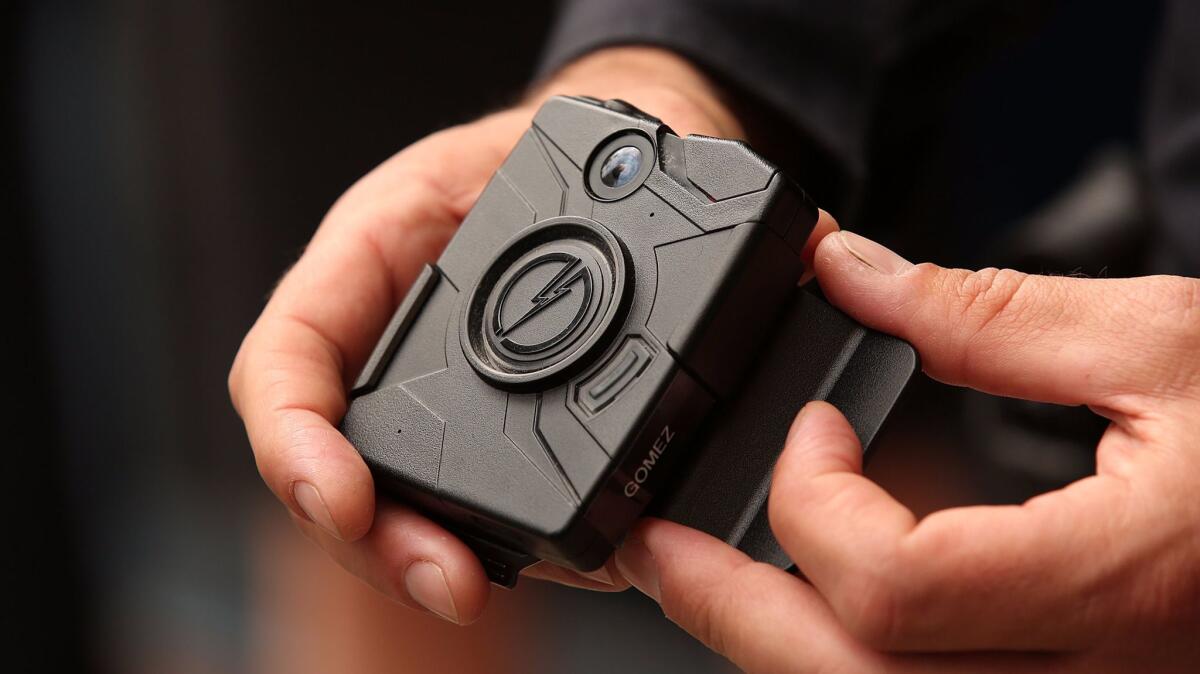L.A. Police Commission unveils process that could lead to public release of LAPD video

In the months since the Los Angeles Police Department began rolling out thousands of body cameras to officers, during a time when video has prompted new scrutiny of policing across the country, a key question persists.
When should the footage become public?
On Tuesday, the civilian board that oversees the LAPD began a process to review the department’s current policy of generally withholding that video — whether it was captured by body cameras, patrol car cameras or otherwise collected during an investigation — unless ordered to release it in court. Some police commissioners, along with Chief Charlie Beck, have indicated in recent months that they were open to revisiting the policy, but Tuesday marked a more formal step toward that.
Matt Johnson, the commission’s president, said at their weekly meeting that his goal was to collect public feedback that could guide a new policy for the LAPD. Johnson said he anticipated that policy would address “key elements,” including “proactively releasing police video” of shootings and other major incidents involving officers and “clear and fair guidelines for when video will and will not be released.”
“This process will further increase our commitment to transparency and accountability by ensuring the public has an opportunity to see for itself the video in these cases,” Johnson told his fellow commissioners.
The four other police commissioners almost immediately lent their support, allowing the process to move forward.
“There’s a lot of different perspectives and issues surrounding release of video, and I think it’s important that we really consider all of them carefully,” commissioner Shane Murphy Goldsmith said.
Johnson’s plan includes working with the Policing Project, a nonprofit based at New York University School of Law, to collect public opinion and then create recommendations for the Police Commission. They plan to gather that feedback through community meetings, questionnaires and interviews with community members, police officers and their union, and others interested in how the LAPD handles video.
The goal, Johnson said, was “to go about this process in a thoughtful way.”
The LAPD has drawn criticism for its reluctance to release video footage, particularly after the city embarked on an ambitious effort to put body cameras on thousands of police officers. When the Police Commission approved the rules for those cameras in 2015, some residents and the American Civil Liberties Union faulted the board for not ensuring the public release of footage. Some said commissioners should have collected more public input before voting on the policy.
That criticism continued at Tuesday’s Police Commission meeting, as some activists urged the board to share footage from an LAPD jail cell where a woman died last spring. Some also said the decision to release footage was long overdue.
“It’s a day late and a dollar short,” activist Michael Novick said.
Beck has expressed concerns about releasing the footage, saying he wants to protect victims’ privacy and the integrity of criminal or civil investigations. But he, like other police chiefs across the country, has been pressured to reconsider, particularly after high-profile shootings by officers.
In a rare move last fall, Beck released footage captured by a surveillance camera that showed 18-year-old Carnell Snell Jr. holding a gun moments before he was fatally shot by police in South L.A. Beck said he acted out of concern for public safety as well as to correct statements by some who knew Snell and insisted the teen wasn’t carrying a gun.
The LAPD has currently deployed about 2,000 body cameras to officers in the field, with plans for roughly 5,000 more in the coming months.
Separately, LAPD officials Tuesday outlined plans to release more information to the public after police shootings and other significant incidents. After providing information at the scene of such incidents, the LAPD will also ensure additional information from their investigation is shared 24 to 48 hours later and again two weeks after that, said Josh Rubenstein, the department’s chief spokesman.
ALSO
2 shot to death in ‘America’s safest big city’ Irvine; gunman in custody
1 dead, 3 injured in stabbing and police shooting near CNN building in Hollywood
L.A. inspectors and engineers to visit scene of Hollywood Hills mudslide
More to Read
Sign up for Essential California
The most important California stories and recommendations in your inbox every morning.
You may occasionally receive promotional content from the Los Angeles Times.











